牛津译林版英语必修二Unit2Welcometotheunit教案
牛津译林版七年级上Unit2Let’splaysports!Welcometotheunit教案
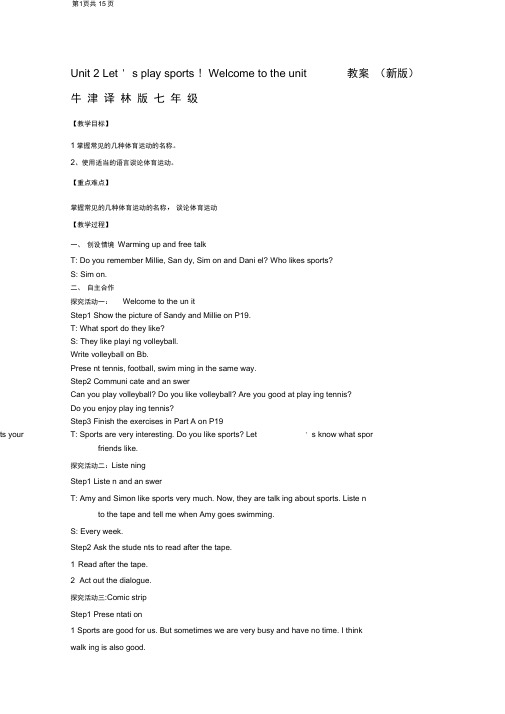
Unit 2 Let ' s play sports ! Welcome to the unit 教案(新版)牛津译林版七年级【教学目标】1掌握常见的几种体育运动的名称。
2、使用适当的语言谈论体育运动。
【重点难点】掌握常见的几种体育运动的名称,谈论体育运动【教学过程】一、创设情境Warming up and free talkT: Do you remember Millie, San dy, Sim on and Dani el? Who likes sports?S: Sim on.二、自主合作探究活动一:Welcome to the un itStep1 Show the picture of Sandy and Millie on P19.T: What sport do they like?S: They like playi ng volleyball.Write volleyball on Bb.Prese nt tennis, football, swim ming in the same way.Step2 Communi cate and an swerCan you play volleyball? Do you like volleyball? Are you good at play ing tennis?Do you enjoy play ing tennis?Step3 Finish the exercises in Part A on P19T: Sports are very interesting. Do you like sports? Let ' s know what spor ts yourfriends like.探究活动二:Liste ningStep1 Liste n and an swerT: Amy and Simon like sports very much. Now, they are talk ing about sports. Liste n to the tape and tell me when Amy goes swimming.S: Every week.Step2 Ask the stude nts to read after the tape.1 Read after the tape.2 Act out the dialogue.探究活动三:Comic stripStep1 Prese ntati on1 Sports are good for us. But sometimes we are very busy and have no time. I think walk ing is also good.Present walking, time, really2 Look, what ' s in Hobo ' s hand? He has a football in his hand. I think he likes football very much. Do you think so? But what about Eddie? What is his favourite sport?3 Let ' s listen to Eddie and Hobo ' s dialogue and answer the question: What sport does Eddie like? Does Eddie really like walk ing?Step2 Practice1 Listen to the tape and follow in chorus. Pay attention to the pronunciation andinton ati on.2 Play role-readi ng.【课堂小结】What have you lear ned in this class? Do you have any questi ons to ask?【作业布置】1. 熟读本课时所学内容,记忆词汇、词组、句型。
牛津译林版英语七下Unit 2《Neighbours》(welcome to the unit)教学

牛津译林版英语七下Unit 2《Neighbours》(welcome to the unit)教学设计一. 教材分析牛津译林版英语七下Unit 2《Neighbours》主要讨论了与邻居相关的日常交流用语。
通过本单元的学习,学生将能够掌握与邻居交流的基本用语,描述邻居的特点以及日常生活中与邻居的互动。
本单元主要包括以下几个部分:welcome to the unit、read and write、listen and say、look and say、task、self-check以及word bank。
二. 学情分析学生在进入七年级下学期时,已经具备了一定的英语基础,能够进行简单的英语听说读写活动。
但部分学生对于日常英语交流仍感到困难,特别是在实际应用中,可能出现表达不准确或胆怯的情况。
因此,在教学过程中,需要关注学生的个体差异,鼓励他们积极参与课堂活动,提高他们的自信心。
三. 教学目标1.知识目标:学生能够掌握与邻居交流的基本用语,描述邻居的特点以及日常生活中与邻居的互动。
2.能力目标:学生能够在实际情景中运用所学知识进行日常英语交流,提高他们的口语表达能力。
3.情感目标:学生能够学会尊重他人,培养良好的邻里关系。
四. 教学重难点1.重点:学生能够掌握与邻居交流的基本用语,描述邻居的特点以及日常生活中与邻居的互动。
2.难点:学生在实际情景中运用所学知识进行日常英语交流,特别是听力和口语能力的运用。
五. 教学方法1.情境教学法:通过设置各种与邻居相关的实际情景,让学生在情境中学习与练习英语。
2.交际教学法:鼓励学生积极参与课堂互动,进行真实的英语交流。
3.任务型教学法:通过完成各种任务,让学生在实践中运用所学知识。
六. 教学准备1.教师准备:提前熟悉教材内容,了解学生的学习情况,设计合理的教学活动和任务。
2.学生准备:预习教材内容,了解本单元的学习目标。
七. 教学过程1.导入(5分钟)教师通过提问方式引导学生回顾上一单元学到的内容,如家庭成员的称呼和特点。
Unit 2 Welcome to the unit课件-高中英语牛津译林版(2020)必修第二册
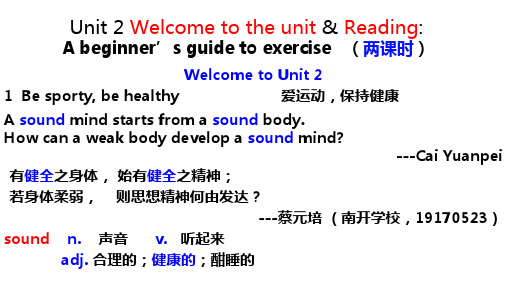
Foods like noodles, rice,fruit and vegetables give your body plenty of carbohydratesto keep up your energy.
After exercise,you need to eat foods rich in protein such as fish, eggs and milk products.
How can a weak body develop a sound mind?
---Cai Yuanpei
有健全之身体, 始有健全之精神;
若身体柔弱, 则思想精神何由发达?
---蔡元培 (南开学校,19170523)
sound n. 声音 v. 听起来
adj. 合理的;健康的;酣睡的
2 Q: What do soccer players and magicians have in common? A: Both do hat-tricks!
2 What do we know from
?
C
A physical activity can prevent heart and lungs working too hard.
B exercise is only good for physical health in the long term.
A Figuring out your expectations. B Having a physical examination
C Developing your physical health D Stretching your muscles A
4 Why does the author compare your body to a car? A
2020-2021学年牛津译林版英语八年级下册Unit2Welcometotheunit教案
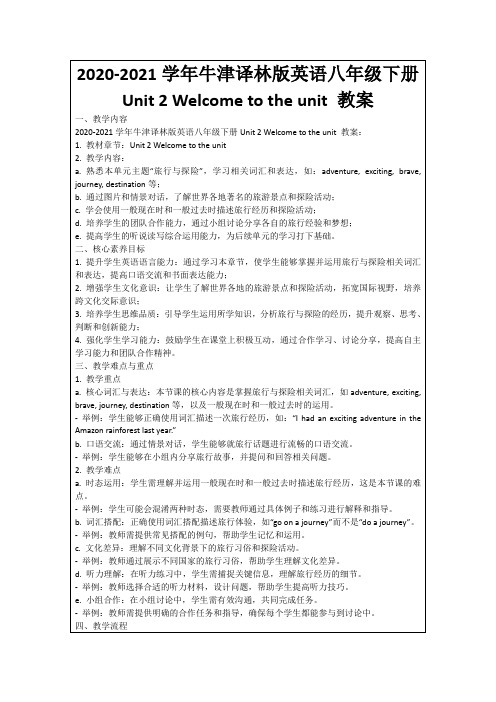
-举例:学生能够在小组内分享旅行故事,并提问和回答相关问题。
2.教学难点
a.时态运用:学生需理解并运用一般现在时和一般过去时描述旅行经历,这是本节课的难点。
-举例:学生可能会混淆两种时态,需要教师通过具体例子和练习进行解释和指导。
b.词汇搭配:正确使用词汇搭配描述旅行体验,如“go on a journey”而不是“do a journey”。
-举例:教师需提供常见搭配的例句,帮助学生记忆和运用。
c.文化差异:理解不同文化背景下的旅行习俗和探险活动。
-举例:教师通过展示不同国家的旅行习俗,帮助学生理解文化差异。
d.听力理解:在听力练习中,学生需捕捉关键信息,理解旅行经历的细节。
-举例:教师选择合适的听力材料,设计问题,帮助学生提高听力技巧。
3.重点难点解析:在讲授过程中,我会特别强调一般现在时和一般过去时的运用,以及旅行与探险相关词汇的使用。对于难点部分,我会通过举例和练习来帮助大家理解。
(三)实践活动(用时10分钟)
1.分组讨论:学生们将分成若干小组,每组讨论一个与旅行相关的实际问题,如旅行计划、目的地选择等。
2.实验操作:为了加深对时态的理解,我们将进行一个简单的对话练习。这个练习将演示如何使用一般现在时和一般过去时描述旅行经历。
此外,我还注意到,部分学生在总结回顾环节,对于今天学习的知识点仍然存在疑问。为了帮助这部分学生更好地掌握知识,我打算在课后提供一些额外的辅导和练习,确保他们能够跟上课程进度。
2020-2021学年牛津译林版英语八年级下册Unit 2 Welcome to the unit教案
一、教学内容
2020-2021学年牛津译林版英语八年级下册Unit 2 Welcome to the unit教案:
牛津译林版七年级英语下册《Unit2Neighbours》Welcometotheunit教案

《Unit 2 Neighbours》Welcome to the unit教案授课时间:年月日总计:课时教学目标:1. .Master the names of all kinds of jobs and working places.2. .Can talk their own towns in English.Teaching contents:Words: neighbour will visitor like wow waiter neighbourhoodSentences: I’m going to visit our neighb ours.教学重点:Words and phrases教学难点:Write sentences about what will do课时安排: 1 课时教学过程:复备栏Ⅰ. Step 1. review①In the afternoon, my family wil l watch a film in a andhave a big meal in a famous .What a wonderful weekend! Now it is time to go to the tobuy something for tomorrow.2. T: Where do you live? What kind of home do you have? What’saround your home? Is your home near a park/a school/a re staurant/a supermarket?Is there a shop/a factory/a cinema/a museum/ahospital near your home? Encourage the students to answer bythemselves.Step2. Presentation1.T: Who lives next to your flat/house? Who lives above/blow you?Who’s your n eighbour? Wha t’s your neighbour? What’s yourneighbour’s name? What does he/she do?Write ‘neighbour’ on the blackboard.2.T: Mr. Lin is my neighbour. He’s a waiter in a big restaurant. Miss Huang lives above me. She’s a teacher.Write ‘waiter’ on the blackboard.Step 3. Practice1.Ask the students to finish exe rci se A.T: We have a lot of neighbours. They have different jobs. Look at the pictures. Where do they work? Please match them with the places. 2.Make a dialogue with a student.Step 4. Presentation1.Make sure the understand the idea of the dialogue B.T: Amy is asking Simon questions. What are these questions about? Please listen to the tape and tell me.2.Encourage the students to the tape and answer.T: The questions are a bout Simon’s home and different places a round his flat.Present ‘neighbourhood’ and write it.Step5.Practise1.Play the tape ,ask the students to answer more questions. eg:(1)Where’s Simon’s flat?(2)How many buildings are there in neighbourhood?(3)How many floors do the buildings have?(4)What does Simon have around his neighbourhood?(5)What does Simon think of his neighbourhood?2.Divide the students into two groups to read.3.Ask some students to make a dialogue using part B as a model.4.Ask some students to act.Step 6. Presentation1.T: Do you often talk with our neighbours? Do you often play withyour neighbours? Do you like visiting them? Do they often visit your home? Do you thin k they’re good visitors? What do you think your neighbours?Write ‘visitor’ on the blackboard.2.ask the students to listen to the t ape and find the answer:Where’sHobo going?3.ask the students to answer more questions according to the tape. Step7.PractiseAsk the students to read the dialogue and act.Step8. Presentation1.Encouage the students to say their ideas acco rding to the comicstrip.2.Arrange the students to talk about and discuss:Wh at can you dofor your neighbours?Step9.Homework1.Remerber all the new words and sentences.2.Ricite the dialogue and part B.3.Finish the exercise.教学反思:。
牛津译林版英语必修2讲义:Unit 2 Section Ⅱ Welcome to the unit

Section ⅡWelcome to the unit &Reading-Language pointsarrange vt.&vi. 安排;排列(教材P22)I've been quite busy arranging my holiday with my older brother,Colin.我最近一直忙着安排我和我哥哥科林的假期。
(1)arrange for为……安排,准备arrange(for sb.)to do sth. 安排(某人)做某事arrange+that 从句安排……(2)arrangement n. 安排,筹划,准备①I arranged that we should meet at eight o'clock.我安排好了我们八点见面。
②I've arranged for a window cleaner to come on Thursday.我已经安排一个窗户清洁工星期四来。
③(朗文辞典)Have you made all your travel arrangements (arrange)?你的旅行都安排好了吗?[名师点津]表示“安排某人做某事”用arrange for sb.to do sth.,而不用arrange sb.to do sth.。
[语境助记]China government has made arrangement for keeping stable in food and drugsafety,but some people haven't arranged for it.中国政府已经为维持食品药品安全形势的稳定做好准备,但还有一些人未做好准备。
desert n.沙漠vt.抛弃,舍弃(教材P22)We're going to ride camels through the Sahara Desert.我们将要骑着骆驼穿越撒哈拉沙漠。
牛津译林版(2019)必修 第二册 Unit2 Welcome to the unit 教案
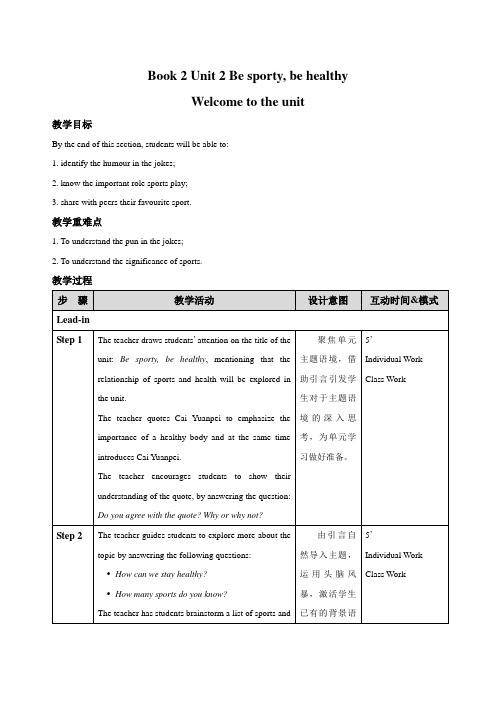
How many sports do you know?
The teacher has students brainstorm a list of sports andthen groupsthem into3 big categories:ball games,trackand fieldandwater sports.
Book 2 Unit 2Besporty, be healthy
Welcome to the unit
教学目标
By the end of this section, students will be able to:
1.identify the humour in the jokes;
2. know the important role sports play;
A: They stand close to thefans.
Cool:
(1)Used to show that you admire or approve of something because it is fashionable, attractive and often different.
Ball:
(1)A round object used for throwing, hitting or kicking in games and sports.
(2)A large formal p来自rty with dance.
Joke5
Q: How do basketball players staycoolduring the game?
Sample answer:
They trick the reader by cleverly playing with words that have more than one meaning.
Unit 2 Welcome to the unit Reading 高中英语牛津译林版
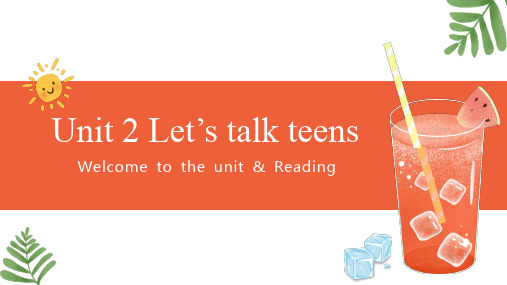
Discussion
Love
Independence
Expectations
Freedom
Patiห้องสมุดไป่ตู้nce
Ambition
Concerns
Eagerness
Parents
Child
Are you always happy with your parent’s unconditional love?
attitude. ● Teenagers’ mental changes are also
important reasons for parent-child tensions.
Read P16-P17, choose true or false and correct the mistakes. 1.It is unusual for teenagers to have difficult relationships with their parents. 2.Teenagers are likely to worry about their physical changes. 3.Parents should always agree with their children to avoid family tensions. 4.Teenagers want both independence and their parents’ love and support. 5.Healthy discussions are necessary to keep the peace between parents and children. 答案 1.F 2.T 3.F 4.T 5.T
高中教育英语必修第二册译林版《3.1 Welcome to the unit》教学课件

Ⅱ.拓展词汇 1.__fo_rm_a_l___ adj.(穿着、言语、行为等)适合正式场合的,正规的, 庄重的→_f_or_m_al_ly___ adv.正式地 2.__tra_d_iti_on___ n.传统,传统的信仰(或风俗)→_tr_ad_it_io_na_l __ adj.传统的; 惯例的→_tr_ad_it_io_na_ll_y___ adv.传统上,依照惯例 3.__cu_s_to_m___ n.风俗,习俗;个人习惯;光顾→_c_us_to_m_er___ n.顾客 4._im_p_re_ssi_o_n __ n.印象,感想;影响,效果→__im_p_re_ss___ vt.使留下深刻 印象;使钦佩→_im_p_re_ss_iv_e__ adj.令人钦佩的;给人深刻印象的
Luckily, I arrived just in time—the show __w_as_a_bo_u_t t_o_be_g_in_____ as I took
my place in the merry crowd.
文本研析·语篇理解
根据课文内容选择正确答案
1.Who is the bride on 10 January according to the passage? C
[3]过去分词decorated作hotel room的前置定语。
I did not understand all of the traditional customs⑪, but a few made a deep impression⑫ on me. One was the bridegroom's⑬ entrance⑭ on a
3.What did Alex do on 26 February? A
牛津译林版高中英语必修2Unit 2Wish you Were hereWelcome to the unit教案4译林版必修2

U n i t2W i s h Y o u W e r e H e r eWelcome to the unit---教案Teaching Aims:1.Learn about traveling2. Develop students’ speaking ability by talking about places in the world and traveling.Teaching Important Point:Develop students’ speaking ability.Teaching Difficult Point:How to get students to speak more and improve their speaking ability.Teaching Methods:1. Free talk to arouse students’ interest in traveling.2. Discussion to make students finish the task of speaking.Teaching Aids:1. The multimedia2. The blackboardTeaching Procedures;Step 1 Greeting and Lead-in(Show the students some pictures on the screen)1. Do you like traveling?Do you want to visit these picturesque places?Why do you want to visit these places?Step 2 Welcome to the unit(Show the students 4 pictures of Africa, Australia, Brazil, and Gobi Desert)Which of these places would you like to visit most?And why?Step 3 Some questions about yourself1. Have you ever been to some places?2. What is the most exciting place you have ever been to?3. Try to describe the place for us.Step 4 Pair WorkBob just come back from Sydney, and now Susan is asking him about his trip.1.Work in pairs and try to use the following expressions.Useful expressions:• What do you think of the city?• How do you find the city?• Are there any places of historic interest to see in this city?• What is the city famous for?• Would you please tell me something about the historic art of the city?• I’d like to look around the city.• How I wish I could go there someday!2. Act out your dialogue in front of the class.Step 5 Discussion-- talk about traveling(show the following on the screen)Bob likes traveling, but Jean thinks it too costly and she has a good idea about how to travel without paying too much.Step 6 Homework1.Find more information about places in the world and traveling.2.Preview the reading text.Good staying with you!Thank you for your cooperation!。
英语4译林牛津教案unit2welcometotheunit

英语4译林牛津教案unit2welcometotheunit教材:牛津高中英语(模块四)高一文档内容:教学设计—教案单元:Unit2Sportingevents板块:Welcometotheunit课堂设计指导思想:那个单元的主题是学生感兴趣的体育赛事,师生之间通过各种有关于体育运动项目的讨论,从而来调动学生的学习主动性,激发他们用英语思维表达的能力,同时通过运动员的品质来向学生展示不服输的体育精神。
Teachingaims:1.Getstudentstotalkaboutdifferentsportsevents.2.Helpstudentsunderstandthespiritofsports.3.TrainstudentstothinkinEnglish.Teachingprocedures:Step1BrainstormRaisethreequestionsrelatedtosports:Doyoulikesports?Whatsportscanyouplay?Whatspo rtsdoyouknow?Whoisyourfavoritesportsperson?【设计说明】体育是特别多人都热衷的项目,通过这三个问题的设置特别好的把学生融入那个话题讨论中,让学生有话可说。
Step2PicturediscussionAllowstudents5minutestolookatthesixpicturesandexchangetheideaswithpartners.Afte rthat,askstudentstotalkabouttheboxingandChineseKongfu.【设计说明】通过图片让学生说出他们所明白的相关的信息。
乒乓球是我国的强项,跳水和体操基本上富有美感的体育项目,比较中国功夫和外国拳击的力道。
通过这一系列的活动,让学生更多的参与到“体育”中来。
Step3DiscussionAskstudentstoexpresstheideatothequestions:Howoftendoyouplaysport?Whatsportsdoyo uusuallyplay?Whydoyouthinksportissopopular?【设计说明】通过学生的讨论来了解他们平时的运动项目和时间,以及他们所感兴趣的体育项目,才而能够明白他们如何才能活动好,身体好,学习好。
高中英语 Unit2 Wish you were here Welcome to the unit教学设计 牛津译林版必修2

单元:Unit 2 Wish you were here板块:Welcome to the unitThoughts on the design:本节课是以看、听、说为主的口语教学课。
英语口语课的教学任务是培养学生口头表达和交际的能力。
如何搞好英语口语教学、培养学生的英语交际能力是实现英语学科教学目的的要害。
美国心理学家布鲁纳认为:“成功的外语课堂教学应在课堂内创设更多的情景,让学生有机会运用自己学到的语言材料。
”本单元内容是关于冒险及旅游的,本节课将利用电脑多媒体手段,以视听的形式给学生介绍世界各地的风光,营造英语教学的真实情景,提高学生运用英语进行交流信息和思想感情的能力,并为本单元后续内容的教学作知识和能力的铺垫。
Teaching aims:After learning the content of this period, the students will be able to get some background knowledge about different places in the world, including the amazing sights and a nimals. Meanwhile, the students’ spoken English will be trained, and their interest will be aroused by talking about traveling.Teaching procedures:Step 1 Greeting and Lead-in1. Nowadays, more and more people are interested in traveling on holidays. They want to go to different places and different countries to get close to nature to enjoy beautiful scenery. Now, please enjoy some beautiful pictures, and then answer my questions.(Show ppt.5-8)①Have you ever been to some places?②What is the most exciting place you have ever been to?③Try to describe the place for us.2. Get the students to work in pairs and discuss the above questions. [Explanation]旅游是学生们喜爱的话题,美丽的风光图片更能引起学生的兴趣,这个教学环节利用PPT展示世界各地风光,吸引学生谈论自己的旅游经历,锻炼他们的口语表达能力。
- 1、下载文档前请自行甄别文档内容的完整性,平台不提供额外的编辑、内容补充、找答案等附加服务。
- 2、"仅部分预览"的文档,不可在线预览部分如存在完整性等问题,可反馈申请退款(可完整预览的文档不适用该条件!)。
- 3、如文档侵犯您的权益,请联系客服反馈,我们会尽快为您处理(人工客服工作时间:9:00-18:30)。
牛津高中英语教学设计
单元:Unit 2 Wish you were here
板块:Welcome to the unit
Thoughts on the design:
本节课是以看、听、说为主的口语教学课。
英语口语课的教学任务是培养学生口头表达和交际的能力。
如何搞好英语口语教学、培养学生的英语交际能力是实现英语学科教学目的的要害。
美国心理学家布鲁纳认为:“成功的外语课堂教学应在课堂内创设更多的情景,让学生有机会运用自己学到的语言材料。
”本单元内容是关于冒险及旅游的,本节课将利用电脑多媒体手段,以视听的形式给学生介绍世界各地的风光,营造英语教学的真实情景,提高学生运用英语进行交流信息和思想感情的能力,并为本单元后续内容的教学作知识和能力的铺垫。
Teaching aims:.
After learning the content of this period, the students will be able to get some background knowledge about different places in the world, including the amazing sights and animals. Meanwhile, the students’spoken English will be trained, and their interest will be aroused by talking about traveling.
Teaching procedures:
Step 1 Greeting and Lead-in
1. Nowadays, more and more people are interested in traveling on holidays. They want to go to different places and different countries to get close to nature to enjoy beautiful scenery. Now, please enjoy some beautiful pictures, and then answer my questions.
(Show ppt.5-8)
①Have you ever been to some places?
②What is the most exciting place you have ever been to?
③Try to describe the place for us.
2. Get the students to work in pairs and discuss the above questions.
[Explanation]
旅游是学生们喜爱的话题,美丽的风光图片更能引起学生的兴趣,这个教学环节利用PPT展示世界各地风光,吸引学生谈论自己的旅游经历,锻炼他们的口语表达能力。
Step 2 Welcome to the unit
Study the four pictures in the text boob, and provide the students with more detailed information
about Africa, Australia, Brazilian rainforest and Gobi Desert.
Africa—The grasslands of Africa are home to many animals, such as lions, elephants, zebras,
giraffes etc. Animals live comfortably and peacefully there.(PPT10)
Australia—Australian’s Gold Beaches: Every year the Gold Coast attracts visitors from all
over the world to sit back, relax and experience its sceneries.
Australia’s typical animals: koala, kangaroo (PPT11-12)
Brazilian—Amazon rainforest in Brazil is very famous. Usually scientists and explorers go there
to make discoveries. It’s home to around 50% of the world’s living species(种类),
many of which are still unknown to humans. (PPT12-13)
Gobi Desert—It’s a huge area of desert covering nearly1.3 million sq km. The area is often
imagined as a lifeless desert like in many other parts of the world but the reality is
quite the opposite. (PPT16-17)
[Explanation]
这个环节利用电脑多媒体给学生播放更多的关于非洲、澳洲、巴西雨林、戈壁沙漠的图片,同时介绍关于这少内容?助学生开阔视野,增加语言信息的输入。
Step 3 Discussion
Get the students to discuss the following question in groups of six.
Which of these places would you like to visit most? And why?
[Explanation]
小组讨论要求学生谈论最想去上述4个地方中的哪一个,进一步训练学生的想象力和口
头表达能力。
Step 4 An interview
Ask the students to conduct an interview:
If you are one of the challengers and have just returned from Australia/ the Brazilian rain
forest/the Gobi Desert …a newspaper reporter is interviewing you.
Show some useful expressions on PPT 21 to help the students to carry on the activity
• What do you think of the …?
• Are there any places of historic, interest to see in …?
• What is the … famous for?
• Would you please tell me something about the historic art of the city?
• I’d like to look around the ….
• How I wish I could go there someday.
[Explanation]
这个环节以记者采访的形式让学生谈论旅游经历,锻炼学生的团队协作能力,同帮助提
高学生的英语会话能力。
Step 5 Language points:
There are a lot of amazing adventures to have and places to see in the world.
1) amaze vt. amazed / amazing
家乡的巨变使我的朋友们非常惊讶。
The great changes in my hometown amazed my friends.
这个实验惊人地成功。
This experiment is an amazing success.
2) adventures to have and places to see
to have / to see在句中充当定语,修饰名词,与其有逻辑上的动宾关系,用不定式的主动形式表被动的意义。
eg: I have nothing to say.
•Lily, do you have anything to say?
•Please give me some paper to write on.
•没有什么值得担心的。
There is nothing to worry about.
•请给我一把可以割东西的刀。
Please give me a knife to cut with.
Step 6 Homework
1. Find more information about places in the world and traveling.
2. Preview the reading text.。
